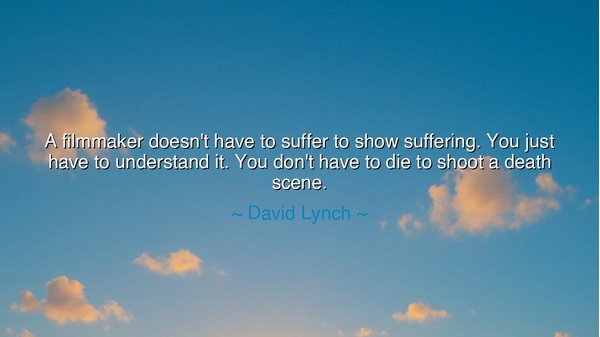
A filmmaker doesn't have to suffer to show suffering. You just
A filmmaker doesn't have to suffer to show suffering. You just have to understand it. You don't have to die to shoot a death scene.






“A filmmaker doesn’t have to suffer to show suffering. You just have to understand it. You don’t have to die to shoot a death scene.” — thus spoke David Lynch, the artist of dreams and shadows, the craftsman who builds worlds from the mist of imagination. His words, though simple, carry a wisdom that reaches beyond the art of cinema and into the heart of all creation. He teaches us that empathy is greater than experience, that true art is not born only from the wounds of the flesh, but from the vision of the soul. To understand suffering is not merely to endure it, but to look upon it with clarity and compassion — to see the pain of others as one’s own without being consumed by it.
The origin of this quote lies in Lynch’s lifelong pursuit of creative purity — his belief that the artist must not become lost in torment to express truth. In an age that glorifies the suffering genius, Lynch stands apart, proclaiming that art does not require martyrdom. He himself, a man often associated with disturbing imagery and psychological complexity, creates not from despair but from serenity. Through practices such as Transcendental Meditation, he finds calm in the chaos, and from that calm he draws the power to depict horror, sorrow, and death with unflinching honesty. Thus, his quote is both a defense and a declaration: one can gaze into the abyss and not fall into it.
The ancients knew this wisdom well. The philosopher Aristotle, in his Poetics, spoke of mimesis — the art of imitation — and taught that the poet’s duty is to represent emotion, not to drown in it. The tragedians of Greece did not need to die upon their stages to convey the grief of heroes; they needed only to understand the nature of tragedy itself — the fall of the mighty, the frailty of human pride, the inevitability of fate. Likewise, Lynch reminds us that an artist’s duty is to be the mirror, not the flame. To reflect suffering truthfully, one must possess empathy and wisdom, not necessarily the scars of every pain one portrays.
History offers a radiant example in the figure of Victor Hugo, who wrote of injustice, poverty, and redemption in Les Misérables. Hugo himself did not live as a starving convict, nor did he perish in the barricades of revolution. Yet he understood the suffering of his time with such depth that his words moved nations and changed hearts. His genius lay not in suffering as his characters did, but in the imaginative compassion that allowed him to inhabit their souls. So too, Lynch’s insight tells us that understanding is the key to truth — that one must feel deeply, but from the vantage of awareness, not destruction.
In this, Lynch’s wisdom also carries a moral for all who live, not only for artists. For how often do men and women believe that they must be broken to comprehend the brokenhearted? How often do we imagine that only those who suffer can show mercy, or that one must be wounded to understand love? But life itself, like art, teaches otherwise. It is not necessary to experience every sorrow to become wise; one must only listen, observe, and open the heart. To understand the pain of others without losing oneself in it — that is the mark of maturity, and of the soul that has learned both strength and compassion.
Moreover, Lynch’s teaching speaks against the dangerous romanticism of suffering as virtue. There are those who mistake pain for depth, chaos for creativity, despair for authenticity. But the truth, as he reveals, is that art — and life — demand clarity of vision. The mind clouded by agony cannot always see; the heart trapped in its own grief cannot always feel for others. Thus, Lynch’s words are not a dismissal of suffering, but a call to transform it — to turn experience into insight, emotion into expression, pain into understanding. The artist’s task, like the philosopher’s, is to see clearly what others only feel dimly, and to give form to what the world cannot yet speak.
Therefore, O listener of tomorrow, take this teaching to heart: you need not suffer to understand suffering. Do not seek pain for the sake of wisdom, nor destruction for the sake of creation. Instead, cultivate empathy, patience, and reflection. Learn from others’ stories, observe the world’s sorrows, and let them awaken compassion rather than despair. If you are an artist, let your art arise not from torment, but from truth. If you are simply human — which is its own form of artistry — let your understanding of others deepen without consuming you. For as David Lynch reminds us, to depict death, one does not need to die — one need only understand life. And in that understanding lies the greatest art of all: the art of being human.






AAdministratorAdministrator
Welcome, honored guests. Please leave a comment, we will respond soon